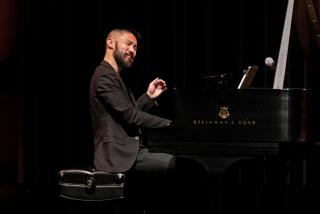Pianist Goode at His Best in the Small, Quiet Moments
- Share via
I bet Richard Goode doesn’t play the Rachmaninoff Third Piano Concerto. He’s not the type; his taste is too refined. It would be like asking Laurence Olivier to play Rambo.
He probably doesn’t play much Bartok or Prokofiev either. Those composers’ use of the piano as a percussion instrument--hammers striking strings--goes against the grain of Goode’s view. He sees the piano as essentially a singing instrument--hammers caressing strings.
His recital Sunday night at the Dorothy Chandler Pavilion was a small miracle of sensitivity, expressivity and nuance. The man is cultivated. He’s got a thousand gradations of sound between pianissimo and mezzo-forte, and he uses them with purpose, not just to show off. Pianists must admire him.
But, well, sometimes you just want him to let loose, to stop making so much sense, to lose control. Just hit the darn thing. His fortes are always reserved, as if he’s pulling them from, not slamming them out of, the keyboard. He’s an absolutely mesmerizing musician in the quiet stuff, but when things get ripping, he’s not always gripping.
His program reflected his sensibilities: a little jewel of a Bach Partita (No. 2), Beethoven at his most congenial (Opus 31, No. 3), Schumann at his most poetic (the Fantasy, Opus 17), Debussy at his reticent best (selected Preludes).
His Bach was unabashedly pianistic--no dry harpsichord-like textures or articulations here. He spun long flowing lines, warmed to the curves of phrases, shaded the hills and valleys of large paragraphs. He wasn’t afraid to make it pretty, but it was never precious.
He missed the Romantic desperation that heightens much of the Schumann, avoiding a wiry edge in his sound, containing the voluptuousness. You wanted him to howl at the moon, but he just wept in the corner. The slow, soft finale, dappled in quiet emotions, was positively exquisite, though.
Goode, the first American to record all 32 of Beethoven’s sonatas, gave a superbly articulate reading of the Sonata No. 18. Technically poised, he dotted every i, made the subtlest of contrasts matter and yet caught the big wave. It was a refined, intelligent, always high-minded conversation--Beethoven with his hair combed.
The four Debussy Preludes--”Des pas sur la neige” and “Ondine” among them--were etched in miniature. We heard them as if from a great distance, but in great detail. These, and a reserved account of the same composer’s “L’Isle joyeuse,” concluded the printed program. No Big Bang for Goode.
And in encore, more of the same: a dainty Chopin Mazurka (Opus 17, No. 5), another Debussy Prelude (“General Lavine: eccentric”) and the Sarabande from Bach’s Fourth Partita. You had to apply elsewhere for cheap thrills.
More to Read
The biggest entertainment stories
Get our big stories about Hollywood, film, television, music, arts, culture and more right in your inbox as soon as they publish.
You may occasionally receive promotional content from the Los Angeles Times.










